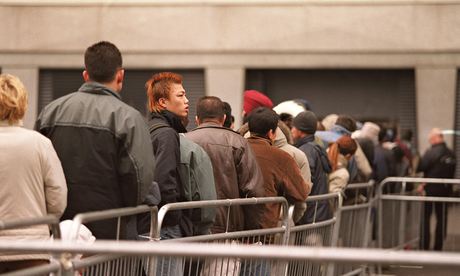
The UK's immigration visa system is unnecessarily complicated and having a damaging impact on the country's creative economy, a Lords committee has said.
The newly established Lords committee on UK "soft power" has accused the government of unbalanced rhetoric on migration and described the inclusion of students in Home Office migration targets as "destructive" and "disingenuous".
The 155-page report, Power and Persuasion in the Modern World, says that "almost every one" of their witnesses testified that the government's new visa policies are "harming the assets that build the UK's soft power", such as film, music and legal services.
They said the editor of the Economist, John Micklethwait, was "scathing" about how increased visa restrictions and costs have affected UK commerce, describing the system as "bananas" and "suicidal".
"I think that visas are just a crime," the newspaper editor said. "It is economically suicidal. It is possibly one of the most bananas policies we could humanly have,"
"All you need to do is to talk to business people or, indeed, students in any other country who want to come and spend money here … it is completely useless in terms of recruiting people," Micklethwait told the committee.
Quoting figures that almost £1 in every £6 spent in Britain by overseas residents came from those who required a visitor's visa, the 12-member committee said the government's rhetoric was also potentially putting people off from arriving.
The coalition, they said, needed to "present and communicate their visa and immigration policies with a level of balance and in a tone that do not discourage those who would add to the UK's prosperity from coming to the UK and supporting its businesses and trade."
"We do not believe that this is always the case at present," the report added.
The newly established committee said the Home Office should remove students from its immigration cap, and that counting students as part of overall migration figures was both "destructive" and "disingenuous". The evidence given to them, they said, "was emphatic" that falls in student numbers were due to UK visa policies and visa administration.
Cardiff university's president and vice-chancellor, Professor Colin Riordan, told the committee the increased cost and complexity of visas had damaged the sector, and that instead of seeing projected growth of up to 15%, the numbers of students coming from abroad dipped by 0.4%.
"Counting students as part of overall migration figures is not only destructive of the UK's attractiveness and international links, but is disingenuous," because many students did not go on to stay in the UK, the report says.
"The government should remove students from net migration targets, and publish data on how previous progress on migration targets would have looked had the government not counted students in previous years," the committee recommended.
They also pointed out that the degree of consensus between six select parliamentary committees on this issue was "unprecedented".
However, a Home Office spokesperson said there would be no change to the way the target was made up. The spokesperson said: "Students will remain in the net migration statistics because they are not all temporary visitors. They have an impact on communities, public services and infrastructure.
"We are determined to prevent abuse of the student route and the changes we have made are having the right effect. The UK is open to the brightest and the best students and the latest figures show the number applying to come to our world-class universities is increasing.
"We are building an immigration system that works in the national interest and supports growth."

